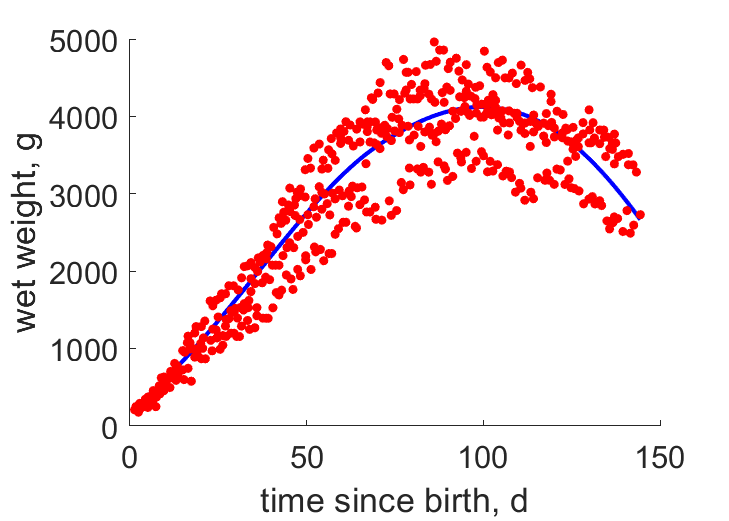Predictions & Data for this entry
| Model: std | climate: MB, MC | migrate: Ml | phylum: |
| COMPLETE = 2.5 | ecozone: MS, MC | food: biCic, biCik, biCit, biSv | class: |
| MRE = 0.029 | habitat: 0iMc | gender: Dg | order: |
| SMSE = 0.004 | embryo: Tnsfm | reprod: O | family: |
Zero-variate data
| Data | Observed | Predicted | (RE) | Unit | Description | Reference |
|---|---|---|---|---|---|---|
| ab | 72 | 71.71 | (0.004035) | d | age at birth | Wiki |
| tx | 145 | 145.7 | (0.004548) | d | time since birth at fledging | HuinPrin2008 |
| tp | 435 | 424.2 | (0.02475) | d | time since birth at fledging | guess |
| tR | 730 | 730 | ( 0) | d | time since birth at 1st brood | HuinPrin2008 |
| am | 1.723e+04 | 1.73e+04 | (0.004138) | d | life span | AnAge |
| Wwb | 187 | 186 | (0.005352) | g | wet weight at birth | HuinPrin2008 |
| Wwi | 5000 | 5032 | (0.006424) | g | ultimate wet weight for females | HuinPrin2008 |
| Ri | 0.00274 | 0.002725 | (0.005263) | #/d | maximum reprod rate | HeddGale1975 |
Uni- and bivariate data
| Data | Figure | Independent variable | Dependent variable | (RE) | Reference |
|---|---|---|---|---|---|
| tW |  | time since birth | wet weight | (0.1194) | HuinPrin2008 |
Pseudo-data at Tref = 20°C
| Data | Generalised animal | Thalassarche chrysostoma | Unit | Description |
|---|---|---|---|---|
| v | 0.02 | 0.01674 | cm/d | energy conductance |
| p_M | 18 | 605.4 | J/d.cm^3 | vol-spec som maint |
| k_J | 0.002 | 0.02581 | 1/d | maturity maint rate coefficient |
| k | 0.3 | 0.3118 | - | maintenance ratio |
| kap | 0.8 | 0.9378 | - | allocation fraction to soma |
| kap_G | 0.8 | 0.801 | - | growth efficiency |
| kap_R | 0.95 | 0.95 | - | reproduction efficiency |
Discussion
- feeding rate is reduced towards the end of the nesting period
- mod_1: Puberty is assumed to coincide with fledging with a waiting time to first brood
Acknowledgment
- The creation of this entry was supported by the Norwegian Science Council (NFR 255295)
Bibliography